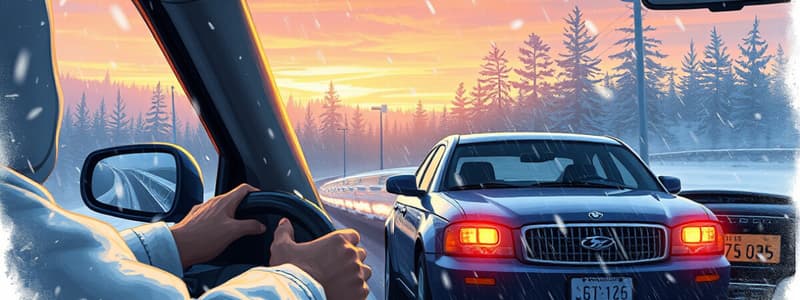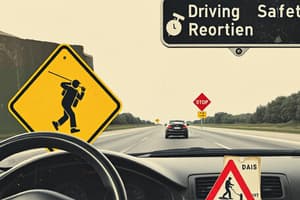Podcast
Questions and Answers
What to do when experiencing __________________________:
What to do when experiencing __________________________:
reduced visibility
What can help with sun glare?
What can help with sun glare?
Sunglasses and sun visor
Use _________________ headlights except when you need to see further down the road.
Use _________________ headlights except when you need to see further down the road.
low-beam
What do when you __________________________ that has their high-beam headlights on:
What do when you __________________________ that has their high-beam headlights on:
What does over-driving headlights mean?
What does over-driving headlights mean?
Keep windshield clear by using wipers and _________________
Keep windshield clear by using wipers and _________________
Wind-driven _________________ can reduce vision and make steering more difficult.
Wind-driven _________________ can reduce vision and make steering more difficult.
When rain _________________ to fall, it mixes with dust and oil so it can become very slippery.
When rain _________________ to fall, it mixes with dust and oil so it can become very slippery.
What does hydroplaning refer to?
What does hydroplaning refer to?
Deep water should be driven through.
Deep water should be driven through.
When fresh snow falls at _________________ temperatures, traction can be fairly good.
When fresh snow falls at _________________ temperatures, traction can be fairly good.
When traffic packs the snow at places like intersections, traction can be _________________
When traffic packs the snow at places like intersections, traction can be _________________
_________________ a vehicle can help move your vehicle out of deep snow.
_________________ a vehicle can help move your vehicle out of deep snow.
_________________ brakes lightly to check your traction in icy areas.
_________________ brakes lightly to check your traction in icy areas.
Ice on _________________ tend to freeze before other roadway surfaces.
Ice on _________________ tend to freeze before other roadway surfaces.
What is black ice?
What is black ice?
_________________ roads can act like marbles under tires and cause skids.
_________________ roads can act like marbles under tires and cause skids.
__________________________ can leave mud, dirt, or sand on the road.
__________________________ can leave mud, dirt, or sand on the road.
What happens in an over-power skid?
What happens in an over-power skid?
What is a front-wheel skid?
What is a front-wheel skid?
What is a rear-wheel skid?
What is a rear-wheel skid?
What is controlled braking?
What is controlled braking?
An _________________ equipped vehicle uses a computer to prevent its wheels from locking.
An _________________ equipped vehicle uses a computer to prevent its wheels from locking.
What does the temperature light indicate?
What does the temperature light indicate?
Turn off your air conditioner when it is too hot, and turn on heater.
Turn off your air conditioner when it is too hot, and turn on heater.
During cold weather, be alert for exhaust leaks caused by __________________________
During cold weather, be alert for exhaust leaks caused by __________________________
Why should you not race a cold engine?
Why should you not race a cold engine?
Do not set __________________________ in cold weather because ice and slush can get stuck.
Do not set __________________________ in cold weather because ice and slush can get stuck.
Tips for smooth _________________ driving include respect for lower speeds and keeping windows clear.
Tips for smooth _________________ driving include respect for lower speeds and keeping windows clear.
Dawn and dusk driving situations can be very dangerous because of the low visual _________________ between moving vehicles and the driving scene.
Dawn and dusk driving situations can be very dangerous because of the low visual _________________ between moving vehicles and the driving scene.
Switch to low-beam headlights the instant you see the _________________ of an oncoming vehicle.
Switch to low-beam headlights the instant you see the _________________ of an oncoming vehicle.
If the water is just over the rims of your tires, drive slowly in _________________ gear.
If the water is just over the rims of your tires, drive slowly in _________________ gear.
When driving at a low speed through water, apply a light brake pressure with your left foot to build friction and create _________________ on your brake pads.
When driving at a low speed through water, apply a light brake pressure with your left foot to build friction and create _________________ on your brake pads.
What can be used to improve traction on snow?
What can be used to improve traction on snow?
What does rocking a vehicle refer to?
What does rocking a vehicle refer to?
_________________ leaves on the road can decrease traction and reduce your stopping and steering control.
_________________ leaves on the road can decrease traction and reduce your stopping and steering control.
What happens after your tires lose all or part of their grip on the road?
What happens after your tires lose all or part of their grip on the road?
What is an over-braking skid?
What is an over-braking skid?
What is fishtailing?
What is fishtailing?
Study Notes
Driving in Adverse Conditions
-
Reduced visibility necessitates slowing down, scanning for hazards, predicting actions of others, managing space, and executing control. Maintain clean windows and lights, use defrosters, and adjust temperature controls.
-
Sun glare can be managed using sunglasses and sun visors to reduce brightness affecting driving.
-
Low-beam headlights should be used unless visibility extends beyond half a mile ahead.
-
When encountering oncoming vehicles with high beams, flick headlights, slow down, and position the vehicle to the right. Monitor oncoming lights to avoid blinding.
-
Over-driving headlights occurs when speed exceeds stopping distance allowed by headlight illumination. Pick a fixed checkpoint to gauge distance and time your response.
-
Maintain windshield clarity with wipers and a defroster to ensure visibility.
-
Wind-driven snow can obscure road markings and reduce steering control, presenting a navigational challenge.
-
Initial rain creates slippery conditions by mixing with dust and oil on roads, requiring cautious driving.
-
Hydroplaning occurs when tires lose contact with the road surface due to water, speed, and tire condition. Awareness and proper speed management are crucial.
-
Avoid driving through deep water, as it can be hazardous for vehicles.
-
Fresh snow at low temperatures often provides better traction compared to packed snow, which can be slippery.
-
Traction decreases when snow gets packed by traffic, especially at intersections.
-
Rocking a vehicle may help in extricating it from deep snow by shifting its weight.
-
Lightly squeezing brakes in icy areas helps assess traction; this should be done cautiously and gradually.
-
Bridges tend to freeze before other roadway sections, increasing the risk of slippery conditions.
-
Black ice forms an invisible danger, especially in mountain areas, and requires vigilant driving.
-
Gravel roads can behave like marbles under tires, increasing the likelihood of skidding.
-
Construction zones may leave debris like mud or sand, affecting road traction.
-
An over-power skid happens when drive wheels spin due to excessive acceleration; relieve pressure from the accelerator to regain control.
-
A front-wheel skid occurs when steering does not result in desired movement; regain traction through careful steering.
-
A rear-wheel skid can cause unexpected lateral movement; often due to over-speeding or braking on slick surfaces.
-
Control braking technique allows for deceleration without locking wheels, essential for maintaining vehicle control in adverse conditions.
-
ABS (Anti-lock Braking System) prevents wheel locking during emergency stops, enhancing safety.
-
The temperature light alerts drivers when the engine becomes too hot, indicating a need for immediate attention.
-
It is advisable to turn off the air conditioner in high temperatures and activate the heater to prevent overheating.
-
Watch for carbon monoxide exhaust leaks during cold weather, especially in vehicles.
-
Avoid revving a cold engine to prevent excessive wear and damage.
-
Setting the parking brake in cold conditions can lead to freezing, so it's best to avoid this action.
Winter Driving Tips
-
Stay informed about traffic through reports, maintain clear windows, respect lower speed limits, and keep a safe following distance.
-
During snowy conditions, aim to keep the vehicle moving and use a low gear on slippery roads, avoiding cruise control.
-
Contrast during dawn and dusk can create dangerous visibility issues, blending moving vehicles with the driving environment.
-
Switch to low-beam headlights upon detecting oncoming vehicles, or when approaching headlights or vehicles that have just passed.
-
In shallow water covering tires, drive slowly in low gear, staying on the higher center of the road to maintain control.
-
Use light brake pressure while moving through water at low speeds to create heat and dry brake pads, maintaining braking efficiency.
-
All-season tires and tire chains enhance traction on snow and ice.
-
Rocking a vehicle involves alternating forward and backward motion to free it from obstacles.
-
Wet leaves significantly reduce traction, increasing the risk of losing steering and braking control.
-
Skids occur after losing tire grip, requiring timely corrections to regain stability.
-
An over-braking skid occurs without ABS, where wheel stoppage happens before the vehicle halts entirely; this can cause loss of control.
-
Fishtailing refers to side-to-side sliding after correcting an initial skid, requiring skillful steering adjustments.
Studying That Suits You
Use AI to generate personalized quizzes and flashcards to suit your learning preferences.
Description
This flashcard set focuses on the critical skills needed for driving safely in adverse conditions. It covers essential strategies such as managing reduced visibility, maintaining control of the vehicle, and understanding environmental factors that affect driving. Test your knowledge and improve your driving safety awareness with these key concepts.




